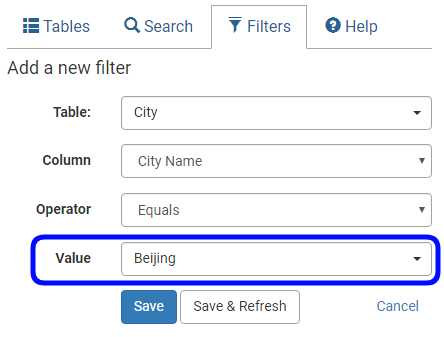<label_value_list>
Learn to configure the <label_value_list> element for Pull Reports™ Ad Hoc
report and data service software.
Catalog Configuration Java API reference:
LabelValuesProvider
A <label_value_list> configures a list of label/value pairs which represent the possible
values of a <column>. <label_value_list>s are used by the Report Creator
Filters Tab
to display the available values for a filter parameter.
The GET Label Value List REST API
returns the list of available values for a <column>.
Usage
Usage with <label_values>
The most straightforward way to configure the list of labels and values for a column is
via a <label_values> element.
In the following example, the possible values for the name column are statically
listed as <label_value>s.
<?xml version="1.0" encoding="UTF-8"?> <catalog xmlns="http://www.pullreports.com/catalog-1.7.0" id="city" name="Cities of the World" xmlns:xsi="http://www.w3.org/2001/XMLSchema-instance" xsi:schemaLocation="http://www.pullreports.com/catalog-1.7.0 https://www.pullreports.com/docs/xsd/pullreports-catalog-1.7.0.xsd"> <report id="demographic-information" name="Demographics"> <export_config defaultColumns="name"/> <table id="city" displayName="City" name="cities"> <column id="name" name="city_name" displayName="City Name"> <label_value_list> <label_values> <label_value value="Beijing">Beijing</label_value> <label_value value="Boston">Boston</label_value> <label_value value="Caracas">Caracas</label_value> <label_value value="Hong Kong">Hong Kong</label_value> <label_value value="London">London</label_value> <label_value value="Los Angeles">Los Angeles</label_value> <label_value value="Nairobi">Nairobi</label_value> <label_value value="New Dehli">New Dehli</label_value> <label_value value="New York">New York</label_value> <label_value value="Paris">Paris</label_value> <label_value value="Rio de Janeiro">Rio de Janeiro</label_value> <label_value value="Vancouver">Vancouver</label_value> </label_values> </label_value_list> </column> <column id="last_census" name="last_census_total" displayName="Last Population" paramType="java.lang.Integer"/> <column id="sq_miles" name="sq_miles" displayName="Area (Sq. Miles)" paramType="java.lang.Double"/> </table> </report> </catalog>
When creating a filter on the
name column within the Pull Reports™ Report Creator, users may select from
one of the given values instead of typing an exact city name.

Here is the identical configuration within the Catalog Configuration Java API.
package com.pullreports.examples.labelvaluelist;
import com.pullreports.model.CatalogId;
import com.pullreports.model.ColumnId;
import com.pullreports.model.LabelValue;
import com.pullreports.model.ParamType;
import com.pullreports.model.ReportId;
import com.pullreports.model.TableId;
import com.pullreports.model.config.CatalogConfiguration;
import com.pullreports.model.config.CatalogConfigurationFactory;
import com.pullreports.model.config.ColumnConfiguration;
import com.pullreports.model.config.ReportConfiguration;
import com.pullreports.model.config.TableConfiguration;
import com.pullreports.model.exportconfig.ExportConfiguration;
import jakarta.servlet.ServletContext;
import jakarta.servlet.http.HttpServletRequest;
import javax.sql.DataSource;
import java.util.Arrays;
import java.util.Collections;
import java.util.List;
public class SimpleLabelValueListCatalogConfigurationFactory implements CatalogConfigurationFactory {
@Override
public CatalogConfiguration makeCatalog(ServletContext servletContext) {
ColumnConfiguration nameColumnConfiguration = new ColumnConfiguration.Builder(
new ColumnId("name"),"city_name")
.setDisplayName("City Name")
.setLabelValuesProvider((DataSource ds, HttpServletRequest hsr) ->
Arrays.asList(
new LabelValue("Beijing","Beijing")
,new LabelValue("Boston","Boston")
,new LabelValue("Caracas","Caracas")
,new LabelValue("Hong Kong","Hong Kong")
,new LabelValue("London","London")
,new LabelValue("Los Angeles","Los Angeles")
,new LabelValue("Nairobi","Nairobi")
,new LabelValue("New Delhi","New Delhi")
,new LabelValue("New York","New York")
,new LabelValue("Paris","Paris")
,new LabelValue("Rio de Janeiro","Rio de Janeiro")
,new LabelValue("Vancouver","Vancouver")
)
).build();
ColumnConfiguration censusColumnConfiguration = new ColumnConfiguration.Builder(
new ColumnId("last_census"),"last_census_total")
.setDisplayName("Last Population").setParamType(ParamType.INTEGER)
.build();
ColumnConfiguration sqMilesColumnConfiguration = new ColumnConfiguration.Builder(
new ColumnId("sq_miles"),"sq_miles")
.setDisplayName("Area (Sq. Miles)").setParamType(ParamType.DOUBLE)
.build();
List<ColumnConfiguration> columnConfigurations = Arrays.asList(
nameColumnConfiguration
,censusColumnConfiguration
,sqMilesColumnConfiguration);
TableConfiguration cityTableConfiguration = new TableConfiguration.Builder(
new TableId("city"),"City",columnConfigurations)
.setName("cities").build();
ReportConfiguration demographicReportConfiguration = new ReportConfiguration.Builder(
new ReportId("demographic-information"),"Demographics",cityTableConfiguration)
.setExportConfiguration(
new ExportConfiguration.Builder().setDefaultColumns(Collections.singletonList(
nameColumnConfiguration.getId()))
.build()).build();
List<ReportConfiguration> reportConfigurations = Collections.singletonList(demographicReportConfiguration);
return new CatalogConfiguration(
new CatalogId("city"),"Cities of the World",reportConfigurations);
}
}
Usage with <label_value_group>
Use a <label_value_group>
to group the label values within the Pull Reports™ Report Creator Filter web form
within HTML <optgroup>s.
Note
Note that even when using <label_value_group>s, it is still permitted to
use <label_value> elements as direct children of <label_values>.
In this example, the <label_value>
Future Spaceport on Mars is included outside a
<label_value_group>.
<?xml version="1.0" encoding="UTF-8"?> <catalog xmlns="http://www.pullreports.com/catalog-1.7.0" id="city" name="Cities of the World" xmlns:xsi="http://www.w3.org/2001/XMLSchema-instance" xsi:schemaLocation="http://www.pullreports.com/catalog-1.7.0 https://www.pullreports.com/docs/xsd/pullreports-catalog-1.7.0.xsd"> <report id="demographic-information" name="Demographics"> <export_config defaultColumns="name"/> <table id="city" displayName="City" name="cities"> <column id="name" name="city_name" displayName="City Name"> <global_label_value_list_ref ref="city_list"/> </column> <column id="last_census" name="last_census_total" displayName="Last Population" paramType="java.lang.Integer"/> <column id="sq_miles" name="sq_miles" displayName="Area (Sq. Miles)" paramType="java.lang.Double"/> </table> </report> <global_label_value_list id="city_list"> <label_values> <label_value_group label="Africa"> <label_value value="Nairobi">Nairobi</label_value> </label_value_group> <label_value_group label="Asia"> <label_value value="Beijing">Beijing</label_value> <label_value value="Hong Kong">Hong Kong</label_value> <label_value value="New Dehli">New Dehli</label_value> </label_value_group> <label_value_group label="Europe"> <label_value value="London">London</label_value> <label_value value="Paris">Paris</label_value> </label_value_group> <label_value_group label="North America"> <label_value value="Boston">Boston</label_value> <label_value value="Los Angeles">Los Angeles</label_value> <label_value value="New York">New York</label_value> <label_value value="Vancouver">Vancouver</label_value> </label_value_group> <label_value_group label="South America"> <label_value value="Caracas">Caracas</label_value> <label_value value="Rio de Janeiro">Rio de Janeiro</label_value> </label_value_group> <label_value value="Future Space Port on Mars">Future Spaceport on Mars</label_value> </label_values> </global_label_value_list> </catalog>
Usage with <label_value_query>
Use a <label_value_query> to dynamically create label
values from a SQL query. In this example, the cities
table contains rows representing all possible cities.
Also in this example, the label values will be <optgroup>'ed
by the value of the continent column within the Pull Reports™ Report Creator Filter
web form.
<?xml version="1.0" encoding="UTF-8"?> <catalog xmlns="http://www.pullreports.com/catalog-1.7.0" id="city" name="Cities of the World" xmlns:xsi="http://www.w3.org/2001/XMLSchema-instance" xsi:schemaLocation="http://www.pullreports.com/catalog-1.7.0 https://www.pullreports.com/docs/xsd/pullreports-catalog-1.7.0.xsd"> <report id="demographic-information" name="Demographics"> <export_config defaultColumns="name"/> <table id="city" displayName="City" name="cities"> <column id="name" name="city_name" displayName="City Name"> <label_value_list> <label_value_query groupColumn="continent"> select city_name as label, city_name as value, continent from cities order by continent </label_value_query> </label_value_list> </column> <column id="state" name="state_abbrev" displayName="State"/> <column id="last_census" name="last_census_total" displayName="Last Population" paramType="java.lang.Integer"/> <column id="sq_miles" name="sq_miles" displayName="Area (Sq. Miles)" paramType="java.lang.Double"/> </table> </report> </catalog>
Usage with <label_value_query> and a Groovy template
<label_value_query>s
may contain constructs supported by Groovy's
SimpleTemplateEngine
such as Groovy or Java math, logic, or String operators and invoke static method calls such as
System.getProperty(String).
Additionally, the
HttpServletRequest
associated with the GET Label Value List
REST API request is available as the request
template attribute.
The following example uses the request template attribute
to configure a label value list contextualized to the user making the API request.
In the example, the current.continent attribute must be set into the
user's HttpSession via a mechanism external to Pull Reports™ such as
via a
HttpSessionListener.
<?xml version="1.0" encoding="UTF-8"?> <catalog xmlns="http://www.pullreports.com/catalog-1.7.0" id="city" name="Cities of the World" xmlns:xsi="http://www.w3.org/2001/XMLSchema-instance" xsi:schemaLocation="http://www.pullreports.com/catalog-1.7.0 https://www.pullreports.com/docs/xsd/pullreports-catalog-1.7.0.xsd"> <report id="demographic-information" name="Demographics"> <export_config defaultColumns="name"/> <table id="city" displayName="City" name="cities"> <column id="name" name="city_name" displayName="City Name"> <label_value_list> <label_value_query> select city_name as label, city_name as value from cities where continent = '${(request.session.getAttribute('current.continent')}' </label_value_query> </label_value_list> </column> <column id="state" name="state_abbrev" displayName="State"/> <column id="last_census" name="last_census_total" displayName="Last Population" paramType="java.lang.Integer"/> <column id="sq_miles" name="sq_miles" displayName="Area (Sq. Miles)" paramType="java.lang.Double"/> </table> </report> </catalog>
Usage with <label_value_query_default>
Use a <label_value_query_default> to configure a label value list from the
distinct set of values within the parent <column>. In this example, the
Pull Reports™ Report Creator Filters Tab, value field will display a select list of the alphabetically ordered
distinct values of the city_name column.
<?xml version="1.0" encoding="UTF-8"?> <catalog xmlns="http://www.pullreports.com/catalog-1.7.0" id="city" name="Cities of the World" xmlns:xsi="http://www.w3.org/2001/XMLSchema-instance" xsi:schemaLocation="http://www.pullreports.com/catalog-1.7.0 https://www.pullreports.com/docs/xsd/pullreports-catalog-1.7.0.xsd"> <report id="demographic-information" name="Demographics"> <export_config defaultColumns="name"/> <table id="city" displayName="City" name="cities"> <column id="name" name="city_name" displayName="City Name"> <label_value_list> <label_value_query_default/> </label_value_list> </column> <column id="state" name="state_abbrev" displayName="State"/> <column id="last_census" name="last_census_total" displayName="Last Population" paramType="java.lang.Integer"/> <column id="sq_miles" name="sq_miles" displayName="Area (Sq. Miles)" paramType="java.lang.Double"/> </table> </report> </catalog>
Children
( <label_value_query> | <label_value_query_default> | <label_values> ) |
Parents
<column> |